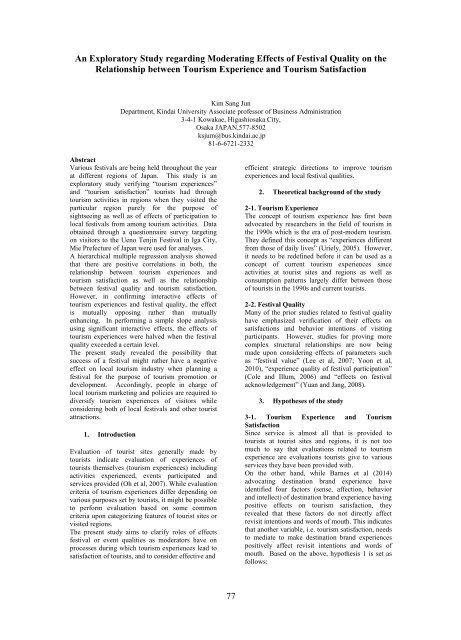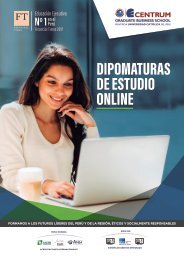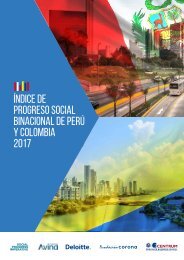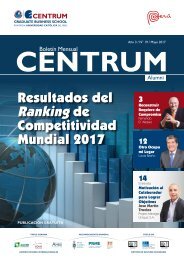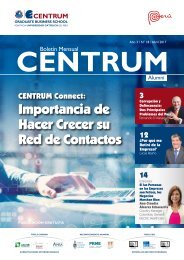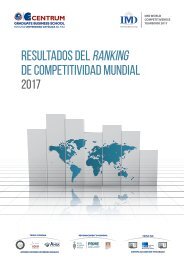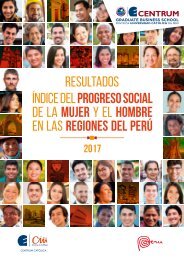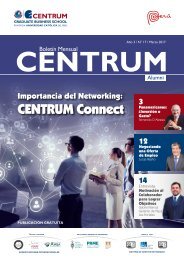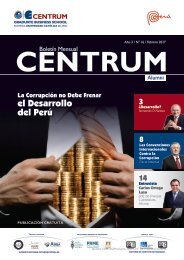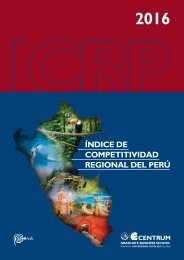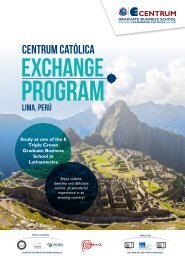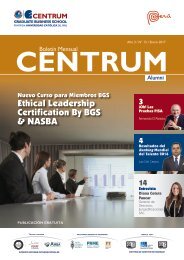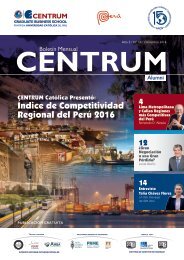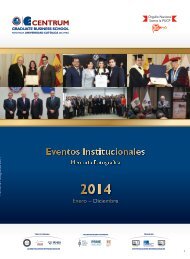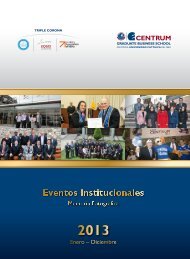Pan-Pacific Conference XXXIV. Designing New Business Models in Developing Economies
This publication represents the Proceedings of the 34th Annual Pan-Pacific Conference being held in Lima, Peru May 29-31, 2017. The Pan-Pacific Conference has served as an important forum for the exchange of ideas and information for promoting understanding and cooperation among the peoples of the world since 1984. Last year, we had a memorable conference in Miri, Malaysia, in cooperation with Curtin University Sarawak, under the theme of “Building a Smart Society through Innovation and Co-creation.” Professor Pauline Ho served as Chair of the Local Organizing Committee, with strong leadership support of Pro Vice-Chancellor Professor Jim Mienczakowski and Dean Jonathan Winterton.
This publication represents the Proceedings of the 34th Annual Pan-Pacific Conference being held in Lima, Peru May 29-31, 2017. The Pan-Pacific Conference has served as an important forum for the exchange of ideas and information for promoting understanding and cooperation among the peoples of the world since 1984. Last year, we had a memorable conference in Miri, Malaysia, in cooperation with Curtin University Sarawak, under the theme of “Building a Smart Society through Innovation and Co-creation.” Professor Pauline Ho served as Chair of the Local Organizing Committee, with strong leadership support of Pro Vice-Chancellor Professor Jim Mienczakowski and Dean Jonathan Winterton.
Create successful ePaper yourself
Turn your PDF publications into a flip-book with our unique Google optimized e-Paper software.
An Exploratory Study regard<strong>in</strong>g Moderat<strong>in</strong>g Effects of Festival Quality on the<br />
Relationship between Tourism Experience and Tourism Satisfaction<br />
Kim Sang Jun<br />
Department, K<strong>in</strong>dai University Associate professor of <strong>Bus<strong>in</strong>ess</strong> Adm<strong>in</strong>istration<br />
3-4-1 Kowakae, Higashiosaka City,<br />
Osaka JAPAN,577-8502<br />
ksjum@bus.k<strong>in</strong>dai.ac.jp<br />
81-6-6721-2332<br />
Abstract<br />
Various festivals are be<strong>in</strong>g held throughout the year<br />
at different regions of Japan. This study is an<br />
exploratory study verify<strong>in</strong>g “tourism experiences”<br />
and “tourism satisfaction” tourists had through<br />
tourism activities <strong>in</strong> regions when they visited the<br />
particular region purely for the purpose of<br />
sightsee<strong>in</strong>g as well as of effects of participation to<br />
local festivals from among tourism activities. Data<br />
obta<strong>in</strong>ed through a questionnaire survey target<strong>in</strong>g<br />
on visitors to the Ueno Tenj<strong>in</strong> Festival <strong>in</strong> Iga City,<br />
Mie Prefecture of Japan were used for analyses.<br />
A hierarchical multiple regression analysis showed<br />
that there are positive correlations <strong>in</strong> both, the<br />
relationship between tourism experiences and<br />
tourism satisfaction as well as the relationship<br />
between festival quality and tourism satisfaction.<br />
However, <strong>in</strong> confirm<strong>in</strong>g <strong>in</strong>teractive effects of<br />
tourism experiences and festival quality, the effect<br />
is mutually oppos<strong>in</strong>g rather than mutually<br />
enhanc<strong>in</strong>g. In perform<strong>in</strong>g a simple slope analysis<br />
us<strong>in</strong>g significant <strong>in</strong>teractive effects, the effects of<br />
tourism experiences were halved when the festival<br />
quality exceeded a certa<strong>in</strong> level.<br />
The present study revealed the possibility that<br />
success of a festival might rather have a negative<br />
effect on local tourism <strong>in</strong>dustry when plann<strong>in</strong>g a<br />
festival for the purpose of tourism promotion or<br />
development. Accord<strong>in</strong>gly, people <strong>in</strong> charge of<br />
local tourism market<strong>in</strong>g and policies are required to<br />
diversify tourism experiences of visitors while<br />
consider<strong>in</strong>g both of local festivals and other tourist<br />
attractions.<br />
1. Introduction<br />
Evaluation of tourist sites generally made by<br />
tourists <strong>in</strong>dicate evaluation of experiences of<br />
tourists themselves (tourism experiences) <strong>in</strong>clud<strong>in</strong>g<br />
activities experienced, events participated and<br />
services provided (Oh et al, 2007). While evaluation<br />
criteria of tourism experiences differ depend<strong>in</strong>g on<br />
various purposes set by tourists, it might be possible<br />
to perform evaluation based on some common<br />
criteria upon categoriz<strong>in</strong>g features of tourist sites or<br />
visited regions.<br />
The present study aims to clarify roles of effects<br />
festival or event qualities as moderators have on<br />
processes dur<strong>in</strong>g which tourism experiences lead to<br />
satisfaction of tourists, and to consider effective and<br />
efficient strategic directions to improve tourism<br />
experiences and local festival qualities.<br />
2. Theoretical background of the study<br />
2-1. Tourism Experience<br />
The concept of tourism experience has first been<br />
advocated by researchers <strong>in</strong> the field of tourism <strong>in</strong><br />
the 1990s which is the era of post-modern tourism.<br />
They def<strong>in</strong>ed this concept as “experiences different<br />
from those of daily lives” (Uriely, 2005). However,<br />
it needs to be redef<strong>in</strong>ed before it can be used as a<br />
concept of current tourism experiences s<strong>in</strong>ce<br />
activities at tourist sites and regions as well as<br />
consumption patterns largely differ between those<br />
of tourists <strong>in</strong> the 1990s and current tourists.<br />
2-2. Festival Quality<br />
Many of the prior studies related to festival quality<br />
have emphasized verification of their effects on<br />
satisfactions and behavior <strong>in</strong>tentions of visit<strong>in</strong>g<br />
participants. However, studies for prov<strong>in</strong>g more<br />
complex structural relationships are now be<strong>in</strong>g<br />
made upon consider<strong>in</strong>g effects of parameters such<br />
as “festival value” (Lee et al, 2007; Yoon et al,<br />
2010), “experience quality of festival participation”<br />
(Cole and Illum, 2006) and “effects on festival<br />
acknowledgement” (Yuan and Jang, 2008).<br />
3. Hypotheses of the study<br />
3-1. Tourism Experience and Tourism<br />
Satisfaction<br />
S<strong>in</strong>ce service is almost all that is provided to<br />
tourists at tourist sites and regions, it is not too<br />
much to say that evaluations related to tourism<br />
experience are evaluations tourists give to various<br />
services they have been provided with.<br />
On the other hand, while Barnes et al (2014)<br />
advocat<strong>in</strong>g dest<strong>in</strong>ation brand experience have<br />
identified four factors (sense, affection, behavior<br />
and <strong>in</strong>tellect) of dest<strong>in</strong>ation brand experience hav<strong>in</strong>g<br />
positive effects on tourism satisfaction, they<br />
revealed that these factors do not directly affect<br />
revisit <strong>in</strong>tentions and words of mouth. This <strong>in</strong>dicates<br />
that another variable, i.e. tourism satisfaction, needs<br />
to mediate to make dest<strong>in</strong>ation brand experiences<br />
positively affect revisit <strong>in</strong>tentions and words of<br />
mouth. Based on the above, hypothesis 1 is set as<br />
follows:<br />
77


